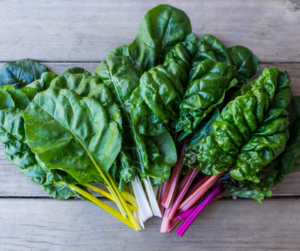By Claire Bacon, ACN, CNC
Gallbladder pain is a very common problem – especially for women. Unfortunately, this often leads to emergency surgery. We see this happen most often right after pregnancy. As opposed to a dull, systemic pain, this signal is very specific. This can come on as a sudden, excruciating pain under the right rib – out of nowhere. There may also be pain behind the right shoulder blade. What usually happens is you go to the ER, they tell you your gallbladder is inflamed and it must come out.
Of course, there’s more to the physiology that doesn’t really get explained to women. You’ve just gone through a long period of high estrogen – about 9 months – and high estrogen can make your bile thick and sluggish. Estrogen increases cholesterol secretion. At the same time, high progesterone can cause muscular tissue throughout the body to relax and the release of bile out of the liver and gallbladder to slow down.
This hormonal situation during pregnancy can lead to gallstones, hard deposits of bile that form in your gallbladder. Gallstones often don’t cause symptoms and can go away on their own, but they can lead to severe pain and infection if they obstruct the flow of bile from the gallbladder. If you find out you have gallbladder problems, changing your diet immediately may help. If not, you may wind up with gallbladder surgery.
Of course, this could happen to anyone – men included! Typically this happens because of a decreased ability to break down dietary fats, maybe from years of consuming a standard American diet, or even infection that affects gallbladder or liver function. Regardless, if you are experiencing warning signs, you should take every precaution possible to save your gallbladder and avoid surgery.
Surgery Is Only Part of the Solution
Think about what happens once the gallbladder gets taken out. The pain may be gone, but you still have the reason why you irritated the gallbladder in the first place – the liver is still sluggish! If you have a congested, sluggish liver, which is full of toxins and excess sugar (or glycogen) you’ll continue to have problems. Your cholesterol levels could be out of balance. Maybe you get really bloated, or you burp after meals, or stools might float or be a light gray color. Or you could be constipated – such a common problem! The inability to digest fats can lead to all of these problems, in addition to frustrating weight gain.
But what if you could find out the key things to change in your lifestyle, to turn things around and get your liver working better? There’s no telling how many things could improve if you work on the function and quality of your bile flow!
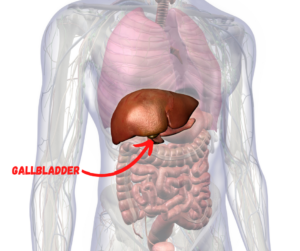
Physiology of the Gallbladder
The gallbladder is a small pouch located in the right upper quadrant of the abdomen, underneath the liver and the right ribs. One small hepatic duct comes from the liver and another comes from the gallbladder; the two join into a common bile duct.
The function of the gallbladder is to store bile, to be later released to break down fats in the intestine. The signal comes once your stomach expands with food – especially fatty food. This causes secretion of cholecystokinin (CCK) from the duodenum, causing contraction of the gallbladder. Concentrated bile emulsifies fats in the process of digestion.
Bile is a complex solution of cholesterol, bile-pigments, bile salts, calcium and water. Under certain situations – and potentially over the course of years – the lining of the gallbladder becomes diseased and the solution becomes unstable, leading to stone formation.
If a stone blocks part of the duct leading to the intestines, the duct becomes distended as bile backs up. Infection or jaundice can result, possibly with nausea or vomiting. Cholecystitis is the official diagnosis for infection and inflammation of the gallbladder. Even though the gallbladder is small, it can cause massive pain. It’s much better to work on your gallbladder health every day – just in case!
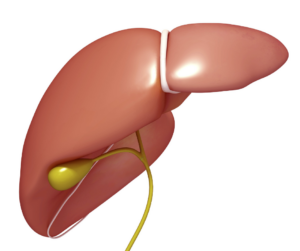
Dietary Considerations
What’s the best food to keep your gallbladder healthy? A few clues… It’s a root vegetable, it provides betaine, it thins the bile and promotes regular bowel movements – it’s beets! Yes, if you’re having symptoms like feeling really bloated, constipated, or burping after meals – you need more beets! And ginger, too. Ginger really helps if you also have nausea. Here are the top 3 things you can do to protect (or restore) your gallbladder function:
#1 Eat beets!
Thanks to the vitamins and nutrients packed in beets (like B vitamins, betaine, glycine, zinc, and phosphorus), this root vegetable can be a great help for common digestive problems like indigestion and diarrhea. Because beets are rich in fiber, they can promote regular bowel movements, too. Just don’t be surprised to see a differently colored stool or urine; it might be the reddish pigment in beets.
Betaine is a substance found in the flesh and peel of fresh, red beets. Betaine is important for promoting the flow of bile and fat metabolism. It also helps reduce levels of homocysteine in the blood, so is good for cardiovascular health. Also, it can help protect the liver from the toxic burden of alcohol.
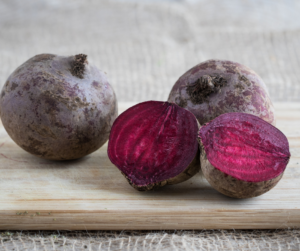
#2 Avoid unhealthy fats
The most important things to avoid are fried foods, fatty foods and particular types of processed fats such as trans fats, hydrogenated fats, partially-hydrogenated fats, and denatured saturated fats. Whatever is manmade or man-altered is not good for you. These fats cause inflammation throughout the body, and within the bile ducts and digestive sphincters.
The worst and most common fats that bog down your liver function are canola oil and vegetable oil. Take it easy on the fried foods in restaurants, because these are what they are using. They are cooking for profit, not for your health!
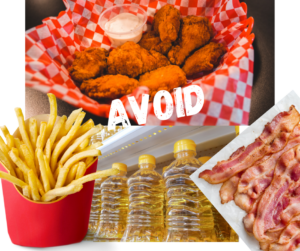
Eventually you will want to include the best essential fatty acids in your diet. Otherwise, you will not be able to absorb vitamins A, D, E or K sufficiently. Omega 3 oils like flaxseed and fish oil are beneficial. Coconut oil should be very easy to digest – probably easier than olive oil or butter. Depending on how severe your liver/gallbladder problem is at the moment, you may have to be very cautious with healthy fats. Add tiny amounts in very slowly.
#3 Consume anti-inflammatory foods
You will want to use your diet therapeutically and choose only foods that promote liver and gallbladder function. These include: ginger, turmeric, dandelion greens, arugula, and artichokes. Check the links for recipes we suggest. You may also like to put a splash of Swedish bitters in your water with meals!
The typical American diet doesn’t include enough bitter foods. Although we have bitter receptors in our brain and throughout the digestive system, we are mostly just consuming sweet, salt, and savory flavors. Exploring the bitter palate can literally turn on your own digestive acids. Consuming bitter foods and bitters in a supplement like Digest Forte can literally fix the problems you may be having with your digestion!
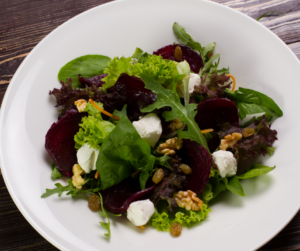
Helpful Supplements for Gallbladder Health
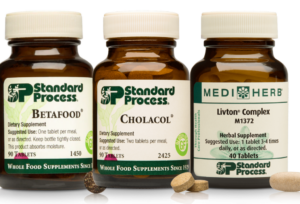
And our favorite recommended supplements:
- Livton – a blend of 5 bitter herbs that act as “cholagogues” – that means they promote bile production and bile flow from the liver. You could consider this product a “liver tonic”. So helpful for so many people – just not during pregnancy because this product contains some potent herbs.
- Betafood – this product is just beets. If you know beets are great for you, but you can’t bring yourself to eat them, take Betafood! We love this for all our pregnant ladies – to keep the bile flowing so you don’t get constipated from all the hormones!
- Cholacol – this is a blend of bile salts and Collinsonia Root. Cholacol is essential for anyone who has lost their gallbladder already. Why? Because it gives you the raw materials necessary for the liver to make the bile you need to digest your fats.
Other alternatives from our Biotics store:
- Beta TCP is very similar to Betafood, as its main ingredient is beets. It also contains digestive enzymes, Vitamin C, and Taurine. If you have been having symptoms like constipation, bloating, or burping after meals, and you still have your gallbladder, this product may be a great fit.
- Beta Plus is like a combination of Betafood plus Cholacol. It is a blend of bile salts, digestive enzymes and organic beet concentrate, along with Super Oxide Dismutase and Catalase. We often start people out on this product when we suspect liver/gallbladder insufficiency, or if the gallbladder has already been removed.
Final Thoughts on Gallbladder Pain
If you’ve never given much thought to your gallbladder, you’ve been lucky so far. A word of warning: the Standard American Diet may eventually catch up with you. The “wrong” foods that make your bile sludgy are way too prevalent in our daily lifestyle. If you’ve seen your friends or family have trouble with gallbladder pain before, and you want to be more proactive, be sure to work on the above steps. You may surprise yourself with how good your digestion feels, and may prevent a surgery in the process!
